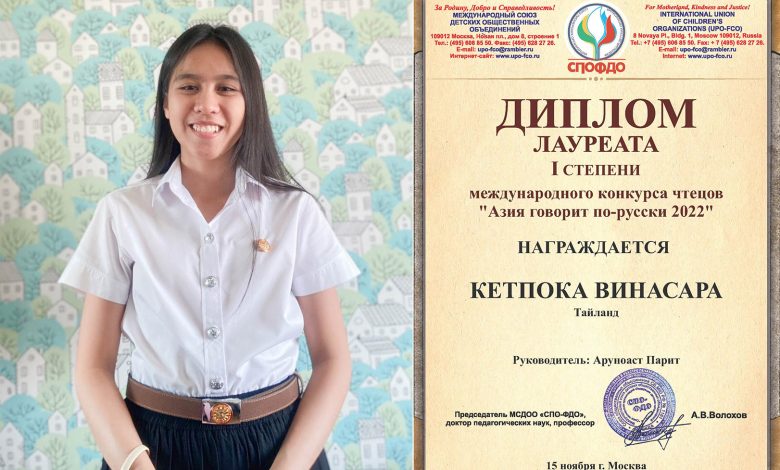Thammasat student, standing at the top of the international level, participated in the Russian prose reading competition.

Recently, Venusara Ketporkha, a third-year student in the Russian Studies Program, Faculty of Liberal Arts, Thammasat University won the first prize in the International Russian Prose Reading Competition on the topic of “Russian-speaking Asia 2022” (АЗИЯ ГОВОРИТ ПО-РУССКИ -2022), 16-23 years old group, having Professor Parit Arunot, Lecturer of the Russian Studies Program, Faculty of Liberal Arts, Thammasat University as the trainer.
The competition was organized by the International Union of Children’s Organizations (UPO-FCO) in collaboration with the Russian social organization “Nash Irkutsk”. There are a total of 3 contest groups from 7-23 years old, with 4 judging criteria: 1) the literary value of the literature; 2) the correctness and clarity of pronunciation, 3) the use of vocal tones, and 4) communication with the audience.
Venusara said that the difficulty of reading Russian prose is the clear and precise pronunciation of the words. In addition, the content of the prose must be understood thoroughly in order to use the tone of voice to communicate emotions in an expressive way and so, the actual mood of the prose is reached. The obstacle I encountered was that it was difficult to find the Thai translations because Russian is not a popular language in Thailand.
The prose selected to be read in this competition is ‘Yesterday You Still Stared into My Eyes’ (Вчера ещё в глаза глядел) by Marina Zvitayeva (Марина Цветаева) is a poem that focuses on conveying the composer’s emotions and feelings from the role and perspective of a woman who is disappointed in love.
Professor Parit revealed that the emotional accessibility of the author is one of the criteria for measuring literary value. It depends solely on the level of understanding of the content of that literature. For example, in the selected prose, the author’s story reflects disappointment in love and the role of a woman. The Russian language is unique with clear subtleties. Hence, to make reading more emotional, one must also understand the way of thinking behind Russian culture. Such difficulty requires strong focus on training and studying, and exposure from listening and observing examples from native speakers of how to read and express emotions.
Venusara concluded that I am truly grateful to receive this award as I had never expected that I would win the first prize. It is a great value for all the time spent practicing. I want to tell my friends who are concentrating on learning foreign languages that when learning a language, we don’t have to concentrate solely on academics. You may try finding new ways to learn through our preferences, like learning through literature, movies or songs and we won’t be bored with learning a language.
The competition is aimed at developing contestants’ creativity through the Russian language, making it possible to reach the emotions of the authors of Russian literature. It also encourages and supports students from different countries to practice and learn Russian language and literature. Over 1,500 participants from various countries in Asia namely Russia, Kazakhstan, Mongolia, Vietnam, China, India and Thailand submitted their readings in the form of prose, poetry, and other forms of clip performances.




